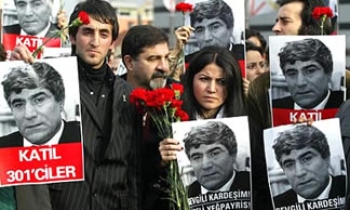The storm over the Danish cartoons has been mistakenly described as a debate over the limits of free speech. One of the milder posters carried during a Londonistan anti-cartoon protest read "FREEDOM OF EXPRESSION IS WESTERN TERRORISM." The coverage in the mainstream American press has ranged from the banal to the bizarre, depicting broad-minded Danes and Dutchmen as raving xenophobes for refusing to tolerate Muslim intolerance.
But the controversy is actually about a struggle for power involving Muslim intimidation and the mandatory multiculturalism of the European political class. Flemming Rose, the Jyllands-Posten editor who published the cartoons in response to ongoing self-censorship by a cowed European press, has explained that what the rioters and their politically correct apologists are demanding is not "respect" but "my submission."
Judging by the craven response of the British government and most of the European political class, they are succeeding. The Islamist leadership across Europe seems now to have largely achieved veto power over the press - except in Denmark - while in the name of multiculturalism, Muslims are subject to no such restraints.
"They think they have won the debate," a British researcher and a convert to Christianity who attended a madrassa as a child in his native Guyana, Patrick Sookhdeo, said. "They believe that the British Government has capitulated to them, because it feared the consequences if it did not." The lesson for Europe's Muslims, he said, is that violence and the threat of violence work.What will follow, according to ICM Research, well-respected pollsters of British Muslims, is a demand in England (and elsewhere) for Islamic extraterritoriality, granting official government recognition to Shariah law in predominantly Muslim areas.
In practice, Shariah has already been partly imposed by Islamic thugs in sections of the British Midlands, as well as the suburbs of Paris and Stockholm. Since women walking in these neighborhoods are subject to stoning and rape, even non-Muslim women have donned the chador as a way of protecting themselves. And in the Netherlands, the upper-middle-class response to aggressive Islamism has been migration to the United States, Canada, and Australia.
Fortunately, two new commanding and readable books illuminate the landscape of Europe's constricting future. Bruce Bawer's "While Europe Slept: How Radical Islam Is Destroying the West From Within" (Doubleday, 256 pages, $23.95) and Claire Berlinski's "Menace in Europe: Why the Continent's Crisis Is America's, Too" (Crown Forum, 288 pages, $25.95) are remarkably complementary. Mr. Bawer, who is an American from Queens, and fluent in both Dutch and Norwegian, is best on Scandinavia and Denmark. Ms. Berlinski, an American who now makes her home in Paris and Istanbul, covers Britain, France, and Germany.
They both make it clear that part of the problem of the European welfare states is not so much that Muslim integration has failed but that it has never really been tried. Immigrants to Britain, notes Ms. Berlinski, don't need to learn English. Social-service pamphlets are translated into their languages by an already large and growing social-service bureaucracy that lives well off the failure to incorporate the newcomers. For his part, Mr.Bawer describes the numerous methods by which Muslims have actively resisted integration. There is the practice known as "dumping," in which Muslim parents send their children back to the home country to be "educated" at schools where the Koran is virtually the only text. Similarly, women accused of leading a "European life" are sent back by their families or clans to their native lands for re-education. In their place, brides steeped in Islamic tradition are imported from the old country. The effect is that growing populations are in Europe but not of it. To make matters worse, the rigid structures of the European economies make it difficult to get work while an easy access to welfare makes it unnecessary, so that the newcomers aren't even integrated into the workplace.
Still, despite Europe's slow growth and generous benefits for not working, many thousands of dark-skinned Hindus in England, Armenians in France, and Poles in Germany are climbing the European ladder. But Muslims are different, notes Mr. Bawer: They see themselves as having a God-given authority that has "made them superior to infidels."
The job of turning Muslims in the Netherlands into Dutch Muslims, both Mr. Bawer and Ms. Berlinski argue, is made all the more difficult by the European loss of identity. First nationalism replaced Christianity, notes Ms. Berlinski, and now, in reaction to the memories of the two world wars, the European Union has, with some success, hollowed out the idea of distinct national characters. Today, for the European political class, nationalism, or any form of populism, carries a distinctly fascist odor. But membership in the European Union is not an identity with any emotional resonance.
Even more significant is the sense, which both authors discuss at length, of European self-loathing. The "spice" of multiculturalism is seen as a welcome addition to the bland European stew. When a Swedish integration official was asked, "Is Swedish culture worth saving?" she replied, "What is Swedish culture?" Her assumption and that of the E.U. political class is that Europeans have to adapt to Muslims, not the other way around. And indeed Sweden, in the wake of the Danish cartoon affair, now seems to have given its imams veto power over what's said about Islam in the Swedish press. Behind the self-loathing is the sense that after World War I, totalitarianism,and World War II, there is only a botched civilization that can provide the security of the welfare state but not much more than a bureaucratic identity.
Still, there is one part of what was once the West that Europeans loathe more than their own: the United States. Europe's largely unaccountable political class and the Islamists are brought together by a shared hostility to the United States. In fact, they tend to fear America far more than Al Qaeda. Western Europe's left-wing lumpen-intellectuals, Mr. Bawer notes, are "half in love with tyranny." The British House of Commons even gave a minute of silence for the memory of the slain Hamas leader Sheik Yassin. Anti-Americanism, Mr. Bawer and Ms. Berlinski note, is increasingly the political glue that holds Europe together,if only to repudiate the American cowboys who had the bad taste not only to liberate the Continent repeatedly but to surpass it in the process. Thus Europeans invariably defend antiquated labor practices that restrain job creation as an alternative to "the American [read: savage] condition."
Worse yet, criticism of Muslims - even when they engage in female genital mutilation, honor killings, or attacks on gays and Jews - is almost invariably defined as "Islamophobic."This has led the Danish journalist Helle Brix to comment bitterly, "If at some time in the not-too distant future fundamentalist Muslims began rounding up Jews, it would be racism to resist."
But then again the Danes are different.They were the one who saved their Jews in World War II, and it was the Danes, remembering Sweden's collaboration with the Nazis, who quipped, "What is a Swede? But a German in human form." The question for self-destructive Europe now is whether Danish courage will spread or remain merely an anomaly.
It's hard to do full justice to the rich material in these two books. Ms. Berlinski, for instance, has a fascinating chapter on the Nazi aesthetic of Rammstein, Germany's most popular band. But if the books have any weaknesses it is the lack of a historical framework. In 1979, the combination of Khomeinei's revolution in Iran, the second oil shock, which gave Saudi Arabia even more money to fund Wahhabi mosques in Europe, and the victory of mujahedeen in Afghanistan changed the way European Muslims defined themselves. Their sense that Islam was once again on the march is the essential backdrop to these books.
Europe, smug in its certainty that its vast sophistication - as opposed to American "militarism" - would pave the way to the future, has been slow to react to the problems posed by Muslim immigration. When there is rioting, the answer is always more dialogue. But then again, Europe's insistence on dialogue as the solution to all problems is often difficult to distinguish from appeasement.
Mr. Siegel is the author of "Prince of the City: Giuliani, New York and the Genius of American Life" from Encounter Books.









